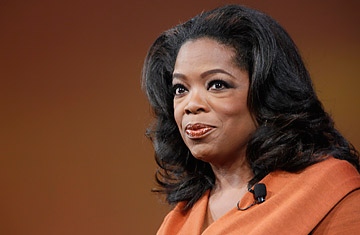
Oprah Winfrey
It's hard not to be fascinated by anything that's written about Oprah Winfrey. Kitty Kelley's latest unauthorized biography — a term she uses despite discomfort with its connotations of "breaking and entering" — goes into as much detail about the Queen of Talk as Kelley's previous books about Jackie Kennedy Onassis, Frank Sinatra and the Bush family. Kelley paints a picture of a woman who learned early on how to suppress information that could hurt her and use the rest to advance her career — even if it meant cutting people out of her life or making them "weed[s] in her garden of grudges." So does Kelley get the goods on Oprah? Yes and no. Here are some hits and misses from Kelley's 544-page tome.
Hits
• Oprah long ago beat Kelley to the revelation that she had been molested as a child. But Kelley's triumph is in the way she contextualizes Oprah's turbulent upbringing — her being shuttled back and forth between Milwaukee and Nashville, the sexual abuse that her family still denies and a teenage pregnancy that may have been the result of being raped by her uncle. Sifting through hundreds of interviews Oprah has given over the years as well as her own interviews with dozens of Oprah family members, childhood friends and former teachers, Kelley succeeds in demonstrating how Oprah's early experiences helped lead to her becoming a TV host who frequently explored the taboo subjects of sex, rape and incest. It was part of her quest to better understand what had happened to her (and also get blockbuster ratings). "Once she went public with her private shame, she wore it like a new hat," Kelley writes. "Her excessive need for control, plus the immense gratification she derived from being the center of attention, applause and approval, had its roots in her adolescent sexual abuse."
• Although she has often claimed to have grown up dirt-poor, with hand-me-down clothing and cockroaches for pets, Oprah may have been exaggerating, says her cousin Katharine Esters, the family historian whom Kelley relies on heavily for many of the details of Oprah's early life. Esters explained to Kelley (corroborated in some cases by Oprah's half sister Patricia) that, while Oprah was not by any means well off, she never had cockroaches as pets, and when she lived in Mississippi, it was in a home owned by grandmother Hattie Mae. Also, at the time, Oprah was an only child and frequently received new clothing and toys from doting family members. Esters says she has confronted Oprah about the stories and that Oprah once replied, "That's what people want to hear. The truth is boring." One caution: Esters may hold a bit of grudge over Oprah's unwillingness to promote her 2005 memoir.
• Ego and hubris — not particularly surprising from someone on Oprah's level. Kelley reports that Oprah spent $47 million on a private jet and got the city of Chicago to pay for a parking lot in the hangar where she stores it. (Mayor Richard Daley has denied this claim.) Accustomed to being excessively regaled by her audiences, the host once allegedly berated a man who refused to give her a standing ovation. It turned out, according to a publishing executive quoted by Kelley, the man was "mentally challenged and severely disabled."
Misses
• Two potentially explosive tidbits are mentioned only briefly by Kelley and dropped without further investigation. One is a claim by Oprah's half sister Patricia that Oprah had sex for money as a teenager. The other is the allegation by a former lover of Oprah's ex-boyfriend Tim Watts (who was married while dating both women) that Oprah had paid Watts $50,000 not to reveal that Oprah's brother was gay and that she had had "lesbian affairs." Kelley offers nothing close to decisive evidence for either.
• One of the most notable products of Kelley's four years of nonstop work on the book was her discovery of the identity of Oprah's real father. And yet she has refused to reveal it because, she says, Oprah herself does not yet know who he is. Some of the most tantalizing quotes in the book come from Vernon Winfrey, the man who raised Oprah and for a time believed her to be his biological child. Responding to questions about the Queen of Talk's penchant for fabricating some of the details of her past, he says, "She may be admired by the world, but I know the truth ... The two of us remain ashamed." But that doesn't make up for Kelley's reticence on what might have been her book's biggest bombshell.
• Oprah's sexuality is still a mystery. Kelley's plan of attack on this most sought-after subject was merely to rehash old gossip about the close relationship between Oprah and her best friend, Gayle King, while adding that Oprah had once told Vernon she was not in love with her longtime beau Stedman Graham. One source called him "window dressing." Kelley repeats Oprah's repeated public denials of the rumors about Stedman and about Gayle. So she dated John Tesh? Yawn! Even Kitty Kelley couldn't find someone who values life so little as to confirm anything more salacious about Oprah's love life.
